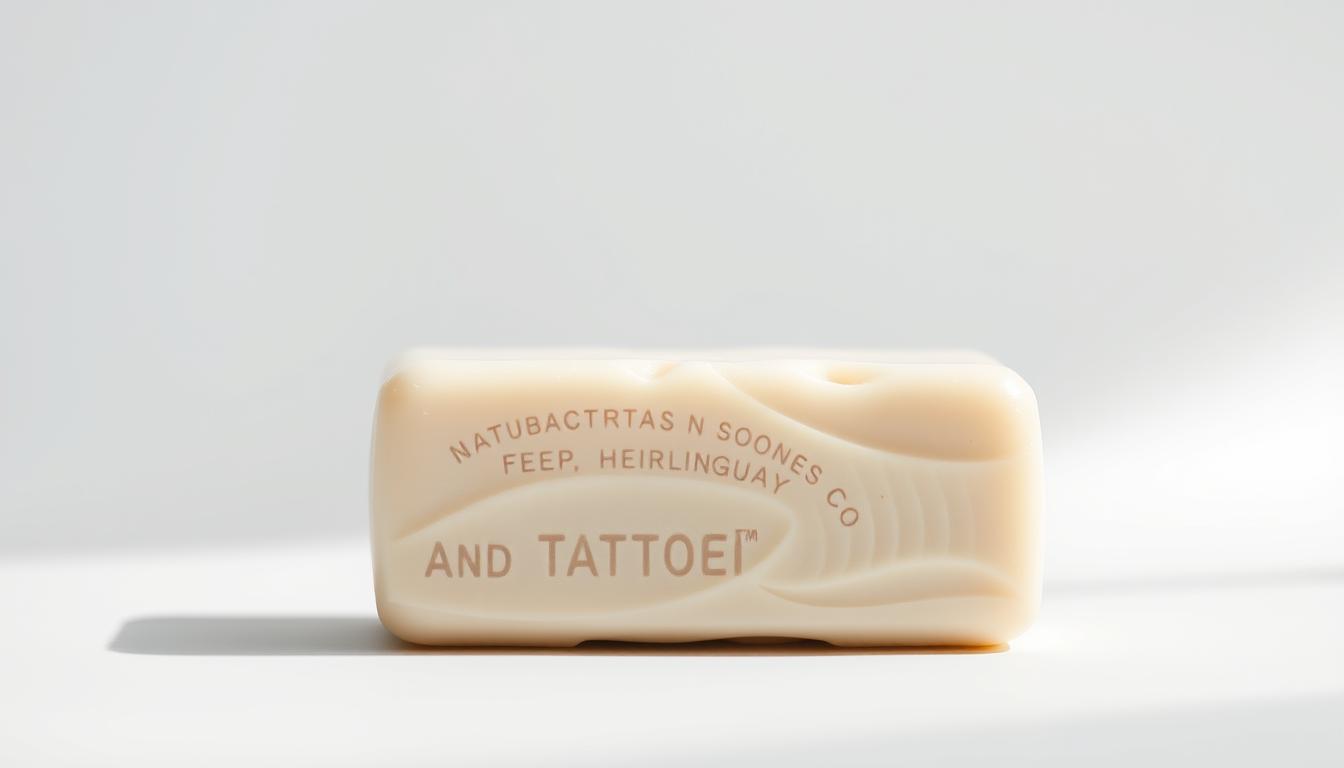
Wondering how to keep your new tattoo safe from infection? Choosing the right aftercare product can be tough. Proper aftercare is key for healing, and the right soap is important.
Using antibacterial soap made for tattoos helps prevent infection and aids healing. This soap is soft on your skin but strong against bacteria. The right soap for aftercare means your tattoo heals better and stays bright longer.
Key Takeaways
- Antibacterial soap is essential for tattoo aftercare.
- Proper soap choice can prevent infection and promote healing.
- Gentle, antibacterial soap is recommended for fresh tattoos.
- Effective aftercare ensures a smoother healing process.
- Choosing the right soap is critical for vibrant tattoos.
What is Antibacterial Soap?
Antibacterial soap is key for tattoo aftercare. It keeps your tattoo clean and fights off infection. This is vital for your tattoo to heal right.
Definition and Purpose
Antibacterial soap kills bacteria and other germs. Its main job is to create a clean space for your tattoo to heal. This helps prevent infection and promotes healthy skin.
How It Works
This soap uses special ingredients to kill bacteria on your skin. Washing your tattoo with it helps stop bacteria from growing. This protects your tattoo from getting infected.
Benefits Over Regular Soap
Antibacterial soap offers better protection against bacteria. For tattoo care, this extra protection is very important. Regular soap might not have the right ingredients to fight off harmful bacteria.
| Feature | Antibacterial Soap | Regular Soap |
|---|---|---|
| Antibacterial Agents | Contains ingredients to kill bacteria | May not contain antibacterial agents |
| Protection Against Infection | High | Low |
| Suitable for Tattoo Aftercare | Yes | No |
Using antibacterial soap for tattoo care is very beneficial. It’s a simple yet effective way to keep your tattoo clean and infection-free.
Why Antibacterial Soap is Essential for Tattoos
Antibacterial soap is key in tattoo aftercare. It keeps your skin free from harmful bacteria. After getting a tattoo, your skin is open to bacteria. The right soap can lower the risk of problems.
Prevents Infection
The main job of antibacterial soap is to prevent infection. Tattoos open up your skin to bacteria. Using this soap cleans the area well, cutting down infection risk. This is very important when your tattoo is new and most at risk.
- Reduces bacterial growth
- Cleanses the tattooed area thoroughly
- Minimizes the risk of infection
Promotes Healing
A clean tattoo heals quicker. Antibacterial soap promotes a healthy environment for healing. It keeps the area clean, letting your skin heal without fighting off infections. This makes healing smoother and your tattoo look better.
“Keeping your tattoo clean is not just about aesthetics; it’s about creating an environment conducive to healing.”
Protects Against Bacteria
Antibacterial soap is made to protect against many bacteria. This is very important for tattoos. Bacterial infections can cause serious issues like scarring and longer healing times. Using antibacterial soap adds extra protection to your care routine.
Some key benefits include:
- Protection against Staphylococcus and Streptococcus bacteria
- Reduced risk of antibiotic-resistant bacteria
- Enhanced overall hygiene during the healing process
Key Ingredients to Look For
To keep your tattoo safe and promote healthy healing, you need to know what ingredients to look for in an antibacterial soap for tattoos. The right ingredients can make a big difference in healing and tattoo health.
Common Antibacterial Agents
Antibacterial soaps for tattoos often have triclosan and tea tree oil. These ingredients fight bacteria and other microorganisms. Exploring different options can help you find the best soap for your needs.
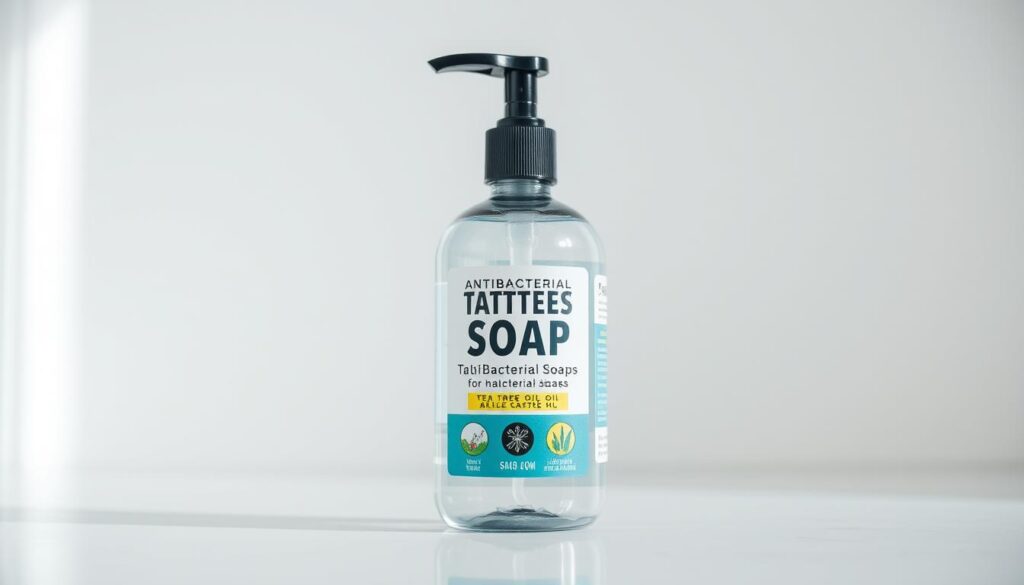
Skin-Friendly Additives
Look for soaps with skin-friendly additives like aloe vera and vitamin E. These ingredients moisturize and soothe the skin. They reduce irritation and promote healthy healing.
Avoiding Harsh Chemicals
Stay away from soaps with harsh chemicals like sulfates and artificial fragrances. These can irritate the skin and damage your tattoo. Choosing a soap without these harsh ingredients ensures your tattoo heals well.
By picking an antibacterial soap for tattoos with the right ingredients and avoiding harsh chemicals, you help your tattoo heal well. This keeps your tattoo looking its best.
How to Use Antibacterial Soap on New Tattoos
Healing a new tattoo starts with using the right antibacterial soap. Keeping it clean is key to avoid infection and help it heal. The right soap can greatly aid in the healing process.
Step-by-Step Cleaning Process
To clean your new tattoo well, follow these steps:
- Wash your hands thoroughly before touching your tattoo.
- Gently wash the tattoo with antibacterial soap and lukewarm water.
- Use a clean, soft cloth to pat the tattoo dry.
For more detailed guidance on tattoo aftercare, you can visit https://nailcutandink.com/clipper-cut/ for additional resources.
Frequency of Use
Wash your tattoo 2-3 times a day with antibacterial soap. Washing too much can irritate the skin, while not enough can cause infection. Finding the right balance is key.
Quote from a tattoo expert:
“Keeping your tattoo clean is not just about washing it; it’s about doing it right. Too much or too little soap can have adverse effects.”
Drying and Moisturizing
After washing, gently pat your tattoo dry with a clean towel. Avoid rubbing or scrubbing to prevent irritation. Once dry, apply a moisturizer to keep it hydrated and aid in healing.
Choosing a soap for tattoo aftercare that is gentle and effective is vital. Look for products that are fragrance-free and hypoallergenic to reduce the risk of allergic reactions.
Recommended Antibacterial Soaps for Tattoos
When you get a new tattoo, picking the right antibacterial soap is key. There are many choices, but you need one that fights bacteria well and is soft on your skin.
Top Brands to Consider
Some brands are experts at making antibacterial soaps for tattoos. Dove, Neutrogena, and Dial are among the best. They have products that are kind to your skin and keep bacteria away.
Looking into special tattoo care products can also be a good idea. They’re made just for taking care of your tattoo after it’s done.
Product Comparisons
When you’re looking at different soaps, think about your skin type, what’s in them, and what others say. For example, if your skin is sensitive, pick a soap without perfume to avoid irritation.
- Dove Antibacterial Soap: It’s moisturizing and cleans gently.
- Neutrogena Body Clear Antibacterial Soap: It has salicylic acid to stop body acne.
- Dial Antibacterial Soap: It comes in many scents and fights many kinds of bacteria well.
Best for Sensitive Skin
If your skin is sensitive, you need a soap that’s perfume-free and hypoallergenic. Neutrogena’s Fragrance-Free Soap is a good pick because it’s gentle and won’t irritate you. Soaps with aloe vera or chamomile can also help soothe your skin.
Always check the ingredients and look for “dermatologist tested” labels. This makes sure the soap is right for your skin.
Myths and Misconceptions
The world of tattoo aftercare is full of myths and misconceptions. If you’re getting a tattoo or have one, it’s key to know the facts. This ensures your tattoo heals well and stays vibrant.
Common Myths About Soap and Tattoos
Many think antibacterial soap is too harsh for new tattoos. But, the right antibacterial soap can be gentle and effective. It’s about finding a soap specifically designed for tattoo aftercare.
Some believe regular soap is enough for aftercare. But, regular soap may not offer the needed protection, leading to infections. Choosing the right soap is key.
Debunking Misunderstandings
Another myth is that more soap means better cleaning. But, using too much soap can dry out your tattoo. A gentle, moderate cleaning is best.
Some think they can’t switch to regular soap after using antibacterial soap. But, after healing, a mild soap is okay. Just remember to keep practicing good hygiene.
Importance of Good Hygiene
Good hygiene is critical in tattoo aftercare. The right tattoo aftercare soap prevents infection and aids healing. As an expert says, “Proper aftercare is not just about avoiding complications; it’s about ensuring your tattoo heals properly and looks its best.”
“The key to a healthy, vibrant tattoo is proper aftercare, starting with the right soap.”
Keeping good hygiene practices is essential. This includes washing your hands before touching your tattoo and using a clean environment for aftercare. 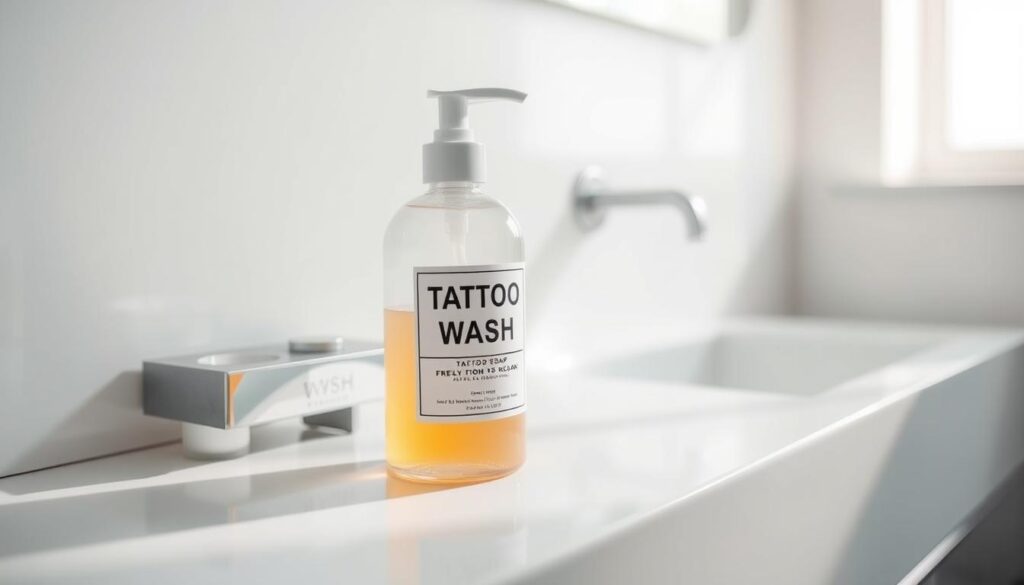
By understanding the myths and misconceptions about tattoo aftercare soap and practicing good hygiene, you can ensure your tattoo heals properly. It will remain a vibrant part of your body art.
Signs of Infection to Watch For
It’s important to watch for signs of infection after getting a tattoo. As your tattoo heals, keep an eye out for any bad reactions. These could mean you have an infection.
Redness and Swelling
Some redness and swelling are normal after a tattoo. But if they get worse or last too long, it might be an infection. Watch the area closely for any changes.
Pus or Unusual Discharge
Pus or odd discharge around your tattoo means you have an infection. Get medical help right away if you see this.
Increased Pain or Fever
Some pain is okay after a tattoo. But if it gets worse or you start to feel feverish, it could be an infection. Using antibacterial soap for tattoos can help avoid these problems.
| Signs of Infection | Description | Action to Take |
|---|---|---|
| Redness and Swelling | Persistence or worsening of redness and swelling | Monitor closely, consider consulting a dermatologist |
| Pus or Unusual Discharge | Presence of pus or discharge around the tattoo | Seek medical attention immediately |
| Increased Pain or Fever | Increase in pain or onset of fever | Use antibacterial soap, consult a healthcare professional if symptoms persist |
Knowing these signs can help you act fast and avoid big problems. For more tips on keeping your tattoo clean and cared for, check out tattoo care resources.
Care Tips After Getting a Tattoo
Getting a tattoo is just the start. The real work is in taking care of it right. This ensures it heals well and stays bright.
Importance of Aftercare
Aftercare is more than just cleaning your tattoo. It’s about creating a healing environment. Using the right soap for tattoo aftercare is key. It prevents infection and helps it heal.
To keep your tattoo clean, wash it gently with a mild tattoo aftercare soap 2-3 times a day. Stay away from harsh or abrasive cleansers that can irritate your skin.
| Aftercare Product | Purpose | Benefits |
|---|---|---|
| Soap for Tattoo Aftercare | Cleans the tattoo | Prevents infection, promotes healing |
| Moisturizers and Ointments | Keeps the tattoo moisturized | Reduces scabbing, promotes skin health |
Role of Moisturizers and Ointments
After washing, apply a moisturizer or ointment to keep it moist. This reduces scabbing and boosts skin health. Choose fragrance-free and hypoallergenic products to avoid irritation.
The right moisturizer or ointment is vital for healing. It keeps the skin soft and lowers the risk of problems.
Avoiding Sun Exposure
Sunlight can fade and damage your tattoo. Keep it covered until it’s fully healed. Use broad-spectrum sunscreen with at least SPF 30 when outside.
By following these tips, your tattoo will heal well and stay vibrant. Remember, good aftercare is essential for your tattoo’s quality and look.
FAQs About Antibacterial Soap and Tattoos
Caring for a new tattoo involves knowing the best ways to heal and prevent infection. Antibacterial soap is often suggested because it keeps the tattoo area clean and free from bacteria.
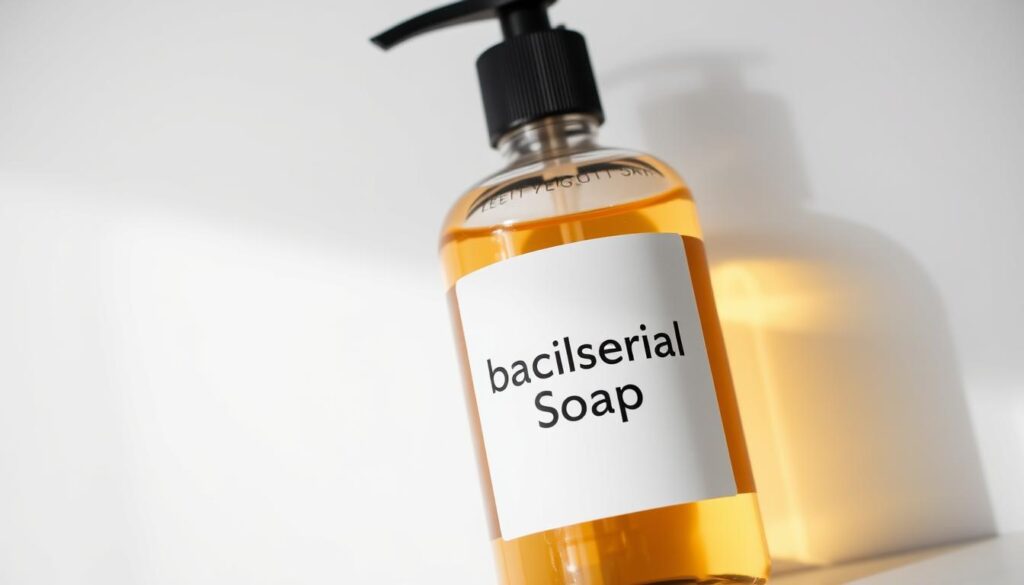
How Often Should I Wash My Tattoo?
Washing your tattoo 2-3 times a day is usually advised. This helps keep it clean without drying out the skin. Use a mild antibacterial soap for tattoos that doesn’t have fragrances to avoid irritation.
Can I Use Regular Soap?
No, regular soap is not good for a new tattoo. It can be too harsh and may irritate the skin. Instead, choose a tattoo antibacterial soap made for aftercare. These soaps are gentler and help with healing.
What If I Experience Allergic Reactions?
If you see signs of an allergic reaction, like redness or itching, stop using the soap right away. You might need to try a different soap or get advice from your tattoo artist or a doctor. Sometimes, a best soap for tattoo healing is suggested to calm the skin.
Knowing the answers to these questions helps you take good care of your tattoo. The right aftercare is key to a healthy, vibrant tattoo.
The Role of Dermatologists in Tattoo Care
Dermatologists are key in tattoo care. They help your tattoo heal right. Their knowledge makes aftercare easier, cutting down risks and promoting healing.
Consulting a Dermatologist
Not sure about tattoo care? A dermatologist can give you personalized tips. They suggest the best tattoo care soap and soap for tattoo aftercare for your skin.
They also stress the need for the right tattoo cleaning soap. This keeps your tattoo clean without irritating your skin.
Importance of Professional Advice
Getting advice from a dermatologist is very helpful. They can spot and fix problems early. This keeps your tattoo healthy and looking good.
- They suggest safe products for your skin.
- They offer tips for managing itching or redness.
- They advise on keeping your tattoo in top shape.
When to Seek Help
Knowing when to see a dermatologist is important. If you see signs of infection like more redness, swelling, or pus, get help fast. They can figure out the problem and tell you how to fix it.
Using the right tattoo care soap and listening to a dermatologist can prevent problems. This ensures your tattoo heals well.
Eco-Friendly Antibacterial Soap Options
More people with tattoos are looking for soap that’s good for the planet. When picking the best soap for tattoo care, eco-friendly options are a smart choice. They help you live more sustainably.
Sustainable Ingredients
For eco-friendly soap, the ingredients matter a lot. Soaps with natural antibacterial agents like tea tree oil are great. They fight bacteria and are safe for the environment. Aloe vera and chamomile are also good because they’re soothing and eco-friendly.
Brands Focused on the Environment
Many brands now make eco-friendly antibacterial soap. These soaps are good for tattoos and the planet. Dr. Bronner’s and Green People are examples. They avoid harsh chemicals, are cruelty-free, and use recyclable packaging.
| Brand | Key Ingredients | Eco-Friendly Features |
|---|---|---|
| Dr. Bronner’s | Tea Tree Oil, Aloe Vera | Cruelty-free, Recyclable Packaging |
| Green People | Chamomile, Green Tea | Organic Ingredients, Biodegradable |
Benefits of Going Green
Choosing eco-friendly soap for tattoos is good for the planet. It also means you’re using gentle products on your skin. These soaps avoid harsh chemicals, which is great for sensitive skin and tattoo healing.
By picking eco-friendly soap, you support green practices. This helps make the environment healthier. As more people want these products, we’ll see even better options in the future.
Customizing Your Tattoo Aftercare Routine
Everyone’s skin is unique, so a custom tattoo aftercare plan is essential. The right soap and techniques can greatly affect healing.
Personalizing Your Cleaning Method
Cleaning your tattoo the right way is key to healing. Choose a tattoo care soap that fits your skin type. If you have sensitive skin, pick a fragrance-free, hypoallergenic soap.
Use lukewarm water and a mild soap to clean your tattoo. Massage the soap gently with your fingertips and rinse well. Stay away from harsh cleansers to avoid irritation and slow healing.
Incorporating Different Products
Adding products to your aftercare routine can help healing. Moisturizers and ointments keep your tattoo moist and aid in skin repair.
| Product | Benefits | Skin Type |
|---|---|---|
| Tattoo care soap | Gentle cleansing, prevents infection | All skin types |
| Moisturizer | Hydrates the skin, promotes healing | Dry or sensitive skin |
| Antibacterial ointment | Prevents infection, promotes healing | Normal to dry skin |
Adjusting for Skin Types
Knowing your skin type is vital for a good aftercare plan. If you have dry skin, use moisturizing soap or lotion. For oily skin, a gentle, oil-free cleanser is best to avoid clogged pores.
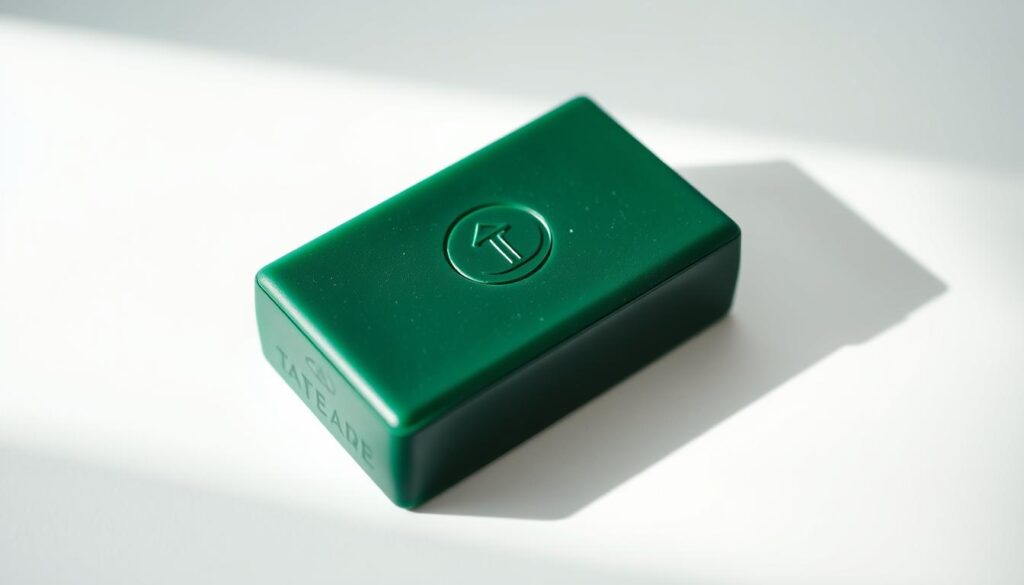
Customizing your aftercare routine for your skin type ensures your tattoo heals well and stays vibrant. The right soap for tattoo aftercare and products are key to a smooth healing journey.
The Impact of Lifestyle on Tattoo Healing
Healing a new tattoo is more than just aftercare products. Your lifestyle plays a big role too. Many factors can help or hurt your tattoo’s healing.
Factors That Affect Healing
Things like your diet, exercise, and stress levels matter. A balanced diet with vitamins and minerals helps a lot.
Eating foods full of antioxidants, like berries and greens, fights inflammation. A diet without key nutrients can slow healing down.
Staying Hydrated and Healthy
Drinking lots of water is key for healing. It keeps your skin moist and helps it heal faster. Drinking enough water also gets rid of toxins that could harm your tattoo.
Keeping your health in check is also important. If you have health issues, managing them well is vital for healing.
Managing Stress
Too much stress can hurt your healing. It causes inflammation and slows healing. Doing things like meditation, yoga, or deep breathing can help.
For tips on keeping your nails and skin healthy, which is good for your tattoo, check out nail care and beauty tips.
Being aware of your lifestyle choices and staying healthy can greatly improve your tattoo’s healing. Using the best soap for tattoo healing along with a healthy lifestyle ensures your tattoo heals well and looks great.
How Often Should I Change My Soap?
Knowing when to switch your antibacterial soap is key for your tattoo to heal right. How often you change your tattoo aftercare soap affects healing. Using the same soap too long can make it less effective against bacteria.
Signs It’s Time for a New Product
There are clear signs it’s time for a new soap for tattoo aftercare. Look out for these:
- The soap has expired or is past its recommended use date.
- You experience any irritation, redness, or itching after using the soap.
- The soap no longer lathers or cleans as effectively as it once did.
- You’ve healed significantly, and your aftercare needs have changed.
Differences Between Brands
Not all tattoo cleaning soaps are the same. Brands vary in antibacterial protection, moisturizing, and skin friendliness. When picking a new soap, think about:
- The ingredients and their effects on tattooed skin.
- Reviews and advice from other tattoo fans or pros.
- The brand’s good name for quality, gentle products.
Monitoring Skin Reactions
It’s important to watch how your skin reacts to new soap. Even if you’ve used a brand before, your skin’s sensitivity can change, more so when healing. Look out for allergic reactions or irritation like redness, itching, or rashes. If you see these, stop using it and try another soap for tattoo aftercare.
By keeping these points in mind and adjusting your soap use, you can keep your tattoo healthy and bright during healing.
Resources for Tattoo Aftercare
Proper aftercare is key for your tattoo’s healing and lasting beauty. Having the right resources can greatly help your tattoo care journey.
Online Communities and Forums
Online forums and communities connect you with others who have similar experiences. You can get valuable tips on using antibacterial soap for tattoos. Plus, learn from others about the best soap for tattoo healing.
Articles and Guides
Many articles and guides offer detailed tattoo aftercare information. They help you understand the importance of using tattoo care soap. You’ll learn how to make it a part of your daily routine.
Professional Support Networks
For personalized advice, talk to professional tattoo artists or dermatologists. They can give you specific guidance on choosing the best soap for your tattoo. They’ll also support you during the healing process.
By using these resources, you can ensure your tattoo heals well and stays vibrant for years. Choosing the right antibacterial soap is a key part of this process.
